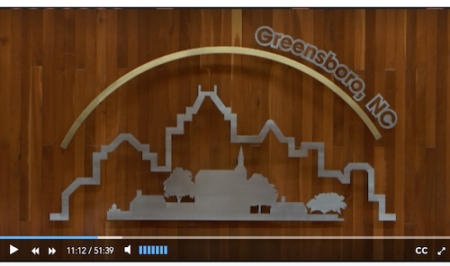One item that should be on the City Council agenda for the Tuesday, Oct. 20 meeting isn’t.
At the Special City Council Meeting on Tuesday, Oct. 6, the City Council voted unanimously to continue what was item 4 on that agenda, “Resolution Adopting Greensboro Police Department Use of Force Reduction Policies.”
The motion to continue that item to the Oct. 20 meeting made by Councilmember Sharon Hightower passed by a 9-0 vote.
The Oct. 6 meeting was an official and properly noticed meeting of the City Council. The vote was properly made and seconded and passed unanimously. Yet despite the legitimate action of the City Council, the item is not on the Oct. 20 agenda.
It is assumed by some city councilmembers that because of the length of the agenda for the Oct. 20 meeting that a decision was made to postpone hearing that item on police use of force until a later date. Hightower asked that it be continued originally because it was late and she had some questions, but the motion and vote was for the item to be heard at the Oct. 20 meeting, not to continue it to a future date to be decided later.
Neither Mayor Nancy Vaughan nor City Manager David Parrish has the legal authority to overrule an official vote by the City Council; only the City Council at an official meeting has that authority.
Councilmember Justin Outling said his understanding was, “staff believed that the council desires not to have it on the agenda.”
But Outling agreed that the item should be on the agenda because, “It was an official act of the council.”
He added, “Staff can’t undo a decision of the City Council.”
It is unusual for the City Council to take an official vote to place an item on the agenda. Usually the make up of the agenda is left up to city staff and Vaughan. But in this case the City Council did make the action official, and its official action was ignored.
If staff polled the City Council and discovered that a majority was in favor of not placing the item on the agenda, that is forbidden by the North Carolina open meetings law. That polling of the council would constitute an illegal meeting because the public was not notified of the meeting nor was the public allowed to attend or, in the case of virtual meetings, watch the meeting.
The North Carolina legislature made allowances for local governing bodies to meet during the pandemic, but it did not authorize secret meetings closed to the public.


Mandate menace and deep state staff work against public meeting requirements in Greensboro?? Keeping the public locked out of discussions and allowing staff to illegally set agendas? At worse this is more insidious and opaque rule by our heavy handed and unilateral Mayor and her staff or it is bumbling inexcusable lack of oversight by our well paid and numerous city attorneys and all other city management positions.
Huh?
It’s time to vote out all of the city council and mayor on Nov 3 .This group of people are the worst leaders that the city has had in a long long time.When will the good and honest Republicans in this city step up and vote in some conservatives to this board.We have seen in other cities that ones led by Democrats all the time will never get away from over taxation and throwing money into the wind.As long as its your tax money these people don’t mind .Lets get together and vote these people out.lets vote Republican this Nov3 .